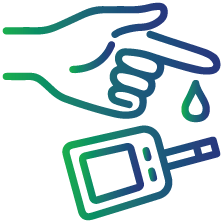
Interleukin-6 Test
Interleukin-6
Interleukin-6 test is a quantitative measurement of the level of interleukin-6 in the blood. Interleukin-6 (IL-6) is an endogenous cytokine that is produced in response to inflammation, tissue injuries, and infections. This test is especially useful for autoimmune diseases such as systemic lupus erythematosus and rheumatoid arthritis. Other than this, IL-6 also helps to evaluate stroke, cardiovascular disease, and diabetes.
Interleukin-6 test is also known as IL-6.
Interleukin-6 helps regulate immune response and B-cell maturation
· Acts as a pyrogen and induces fever during infectious, non-infectious, and autoimmune diseases
· Causes increased susceptibility to a juvenile form of rheumatoid arthritis and diabetes mellitus
· Enhances the production of clotting factor (fibrinogen)
· Helps in the early differentiation of T-cells
· Boosts antibody release in the form of immunoglobulin A (IgA) and G (IgG)
· Plays a key role in the development of blood cells (white cells, red cells, and platelets)
Symptoms of Autoimmune Diseases
Interleukin-6 test is recommended if a person shows signs and symptoms of an autoimmune disease such as systemic lupus erythematosus (SLE) and rheumatoid arthritis (RA). Common symptoms include:

Fatigue or tiredness

Fever

Joint pain

Stiffness in joint

Tenderness and swelling in joints
What is Interleukin-6 test used for?
Interleukin-6 levels help in the early detection of several health issues as given below

Systemic Lupus Erythematosus (SLE)

Diabetes mellitus

Cardiovascular disease

Rheumatoid arthritis
Preparation for test
No special preparation is required for this test. A blood sample is drawn from a vein in your arm, collected in a vial or test tube, and sent to the laboratory for further investigation
Interpretation of results
Normal value: <7pg/ml (picograms per milliliter)
Deviation from normal value:
· A normal level of IL-6 indicates that the person is not suffering from any infection or inflammation.
· A value that is higher than the normal range indicates that the person is suffering from an inflammatory condition that could lead to complications. An increase in IL-6 is seen in autoimmune diseases, diabetes, sepsis, cardiovascular disorders, some cancers, infections, and stroke.
A value that is lower than the normal range may be seen in most patients due to the presence of a less severe inflammatory response
FAQs
Is fasting necessary before undergoing interleukin-6 test?
No, fasting is not required prior to taking the interleukin-6 test. This test can be done at any time during the day
What is the turnaround time (TAT) for interleukin-6 test?
The turnaround time for this test is usually 72 hours (3 days) after the collection of the blood sample
Is any other test recommended along with IL-6 test?
Usually, a person who shows signs and symptoms of an inflammatory condition or an infection is advised to undergo a C-Reactive Protein (CRP) test along with an IL-6 test
Are there any risks involved in the IL-6 test?
As this test requires a blood sample to be drawn from a vein in your arm, you might experience a slight pricking pain that goes away on its own within a few minutes. Sometimes, you may have slight bruising or infection at the site where the needle was inserted
How does IL-6 test help in case of COVID-19?
During the recent COVID-19 pandemic, IL-6 test was used extensively to evaluate and monitor the immune reaction in COVID-19 patients. This test helps to study the pattern of inflammatory cytokines such as interleukin-6 in such patients

